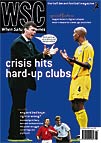 Major League Soccer just can't get noticed, but it's not for a certain wealthy man's want of trying, reports Mike Woitalla
Major League Soccer just can't get noticed, but it's not for a certain wealthy man's want of trying, reports Mike Woitalla
The world’s 54th richest man spends his cash in various ways. He helped fund a senator who advocated hanging criminals in the street. He donated to a campaign against allowing the use of marijuana by people suffering from AIDS, cancer and multiple sclerosis. He supported a Colorado referendum designed to prevent civil rights protection for gays. His name is Philip F Anschutz. He spends very much money on Major League Soccer.
According to GQ, Anschutz destroyed wetlands to enlarge his private golf course. He has donated hundreds of millions of dollars to the Republican Party. Some would surmise that helped get him the Bush administration’s permission to drill for oil in Montana’s Valley of the Chiefs, imperilling what is a holy site to dozens of Native American tribes.
He is an environmentalist’s enemy and an American soccer fan’s best friend. Without Anschutz, whose wealth has reportedly fluctuated between $9.6 billion and $18 billion, MLS would not be entering its seventh season. In January, the league folded its two Florida franchises, Tampa Bay and Miami. That leaves ten teams. Anschutz owns five of them and helps pay the debts of at least two others.
He started with one club, his hometown Colorado Rapids, when the league began in 1996. He brought in Chicago in 1998, then bought out Los Angeles. He took control of DC United when its investors bailed out in 2000. Last year, he acquired the MetroStars of New Jersey because its owners, including John Kluge, the US’s tenth richest man, quit.
Anschutz is building a stadium and training facilities for his Los Angeles Galaxy that will also serve the national teams. He purchased TV rights to the 2002 and 2006 World Cups and used them to persuade ABC/ ESPN to broadcast MLS.
In 1967, Anschutz bought oil fields on credit and hit the right spots. He earned his first billion by selling out before the global price collapse in 1982. He bought a floundering railway and used the track right-of-way to lay fibre-optic cable, form-ing the Qwest empire that earned him more billions. Qwest’s value plummeted last year, accounting for his drop from the world’s 16th richest person.
He owns ice hockey and basketball teams, but soccer is his favourite venture. He is known to show childlike enthusiasm around his MLS players. Still, no one believes he would fund soccer without seeing future profits. There are few who have his faith. MLS averaged 17,406 crowds in its first year but hasn’t broken the 15,000 mark since. Miami Fusion owner Ken Horowitz claimed his group put $50 million into the franchise. He was rewarded with a league low 9,345 average crowd during its four-year run. Tampa Bay, averaging 11,072, couldn’t find an owner and were run by the league for six seasons.
In the MLS the owners operate teams but share league-wide losses – so far, about $250 million. Officials claim they will find investors for Dallas and San Jose, the last two teams with no owners. They say cur-rent investors are committed until 2006 and new ones will be enticed by the rosier financial picture of the new, leaner MLS.
Creating black ink depends largely on stadiums. Columbus Crew built one and have profited. Other teams watch revenue from parking and concessions flow to their landlords while MLS pays high rents and second fiddle to primary tenants of the oval-ball sort. But even with Anschutz leading the charge on the construction front, there remains a formidable challenge.
Soccer, enormously popular as a participation sport, is trying to get the attention of a population that has more entertainment options than any society in history. Apart from the traditional rival sports, the hottest thing among young males is professional wrestling, broadcast 15 hours a week on five networks. There are myriad non-athletic diversions and competition from soccer itself. The four million kids who play can’t drag their parents to watch MLS. Moreover, on an average weekend fans can watch around 20 foreign league games on TV, not counting pay-per-view.
In his last press interview, in 1974, Anschutz spoke of his success in oil: “As a wildcatter, 95 per cent of everything you do is failure. Most holes are dry… I was determined not to fail.” The now notorious Anschutz determination may be bad news for the Comanche, Sioux and Blackfeet. It is MLS’s last hope.
From WSC 183 May 2002. What was happening this month